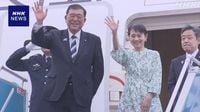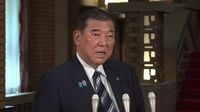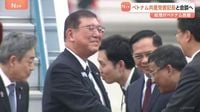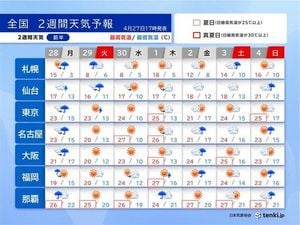On April 27, 2025, Prime Minister Ishizaki departed Japan for a four-day visit to Vietnam and the Philippines, aimed at strengthening economic and security ties in light of increasing tensions in the region. Ishizaki's trip comes at a crucial time, as he seeks to reaffirm the importance of a free trade system while addressing the impacts of tariffs imposed by the Trump administration.
Upon his arrival in Hanoi, Vietnam, at around 4 PM Japan time, Ishizaki is set to meet with the General Secretary of the Communist Party of Vietnam, Nguyen Phu Trong. This meeting is pivotal, especially following a recent visit by Chinese President Xi Jinping to Vietnam, which raised concerns about China's increasing assertiveness in the South China Sea.
Ishizaki emphasized the importance of cooperation between Japan and Southeast Asia, stating, "Southeast Asia plays an extremely important role in realizing a free and open Indo-Pacific." He highlighted that the region's stability is crucial for Japan's national security and economic interests.
During his visit, Ishizaki plans to inspect an industrial park where approximately 100 Japanese companies, including manufacturers of electrical machinery and automobile parts, operate. He intends to gather insights from business leaders about the effects of U.S. tariff measures on their operations. Ishizaki remarked, "As a country, we cannot accept these tariff measures. Japan is the world's largest investor and employer, and we will seek revisions to these tariffs."
He further pointed out that the impact of these tariffs extends beyond Japan, affecting countries such as Vietnam, Thailand, and China. "We need to consider how these tariffs will affect not just Japan, but also our partners in the region," he noted. This perspective is crucial as Japan seeks to enhance its presence in Southeast Asia amid growing geopolitical tensions.
In the Philippines, Ishizaki's agenda includes strengthening relations with the Philippine Coast Guard, which regularly confronts Chinese vessels in contested waters. Observing the coast guard's operations will allow Ishizaki to assess the security landscape and discuss collaborative efforts to ensure maritime safety in the region.
The discussions during Ishizaki's meetings are expected to focus on the broader implications of U.S.-China relations and how they affect global trade dynamics. Ishizaki aims to maintain a multilateral free trade system, which he believes is vital for regional stability and economic growth.
As part of his diplomatic efforts, Ishizaki will also address the challenges posed by the Trump tariffs and the need for a coordinated response among affected nations. He is keen on understanding the specific challenges faced by Japanese companies operating in Vietnam and the Philippines, as well as gathering feedback on how these tariffs are impacting their competitiveness.
In a press briefing prior to his departure, Ishizaki explained the rationale behind choosing Vietnam and the Philippines as destinations for his visit. He stated, "The aim is to achieve results in security cooperation with China in mind, and to discuss the confusion in the international economy due to the Trump tariffs with both countries." This strategic approach underscores Japan's commitment to enhancing its diplomatic footprint in Southeast Asia.
Ishizaki's visit is not only about addressing immediate economic concerns but also about laying the groundwork for long-term partnerships in the region. As Japan navigates the complexities of U.S.-China relations, its focus on Southeast Asia could prove vital in balancing its strategic interests.
In conclusion, Prime Minister Ishizaki's visit to Vietnam and the Philippines highlights Japan's proactive stance in addressing regional security and economic challenges. By fostering cooperation and seeking to mitigate the impacts of international tariffs, Japan aims to strengthen its ties with Southeast Asian nations and enhance its influence in a rapidly evolving geopolitical landscape.






